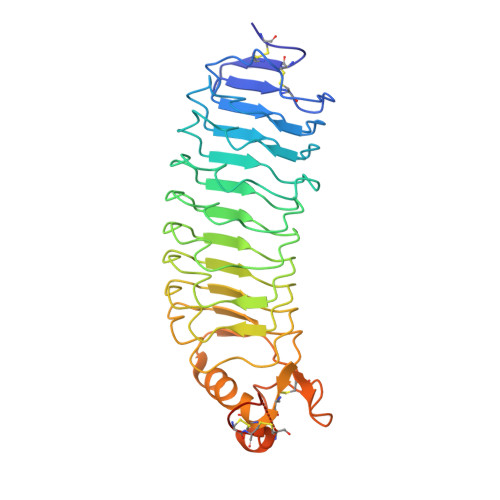Nogo Receptor crystal structures with a native disulfide pattern suggest a novel mode of self-interaction.
Pronker, M.F., Tas, R.P., Vlieg, H.C., Janssen, B.J.C.(2017) Acta Crystallogr D Struct Biol 73: 860-876
- PubMed: 29095159
- DOI: https://doi.org/10.1107/S2059798317013791
- Primary Citation of Related Structures:
5O0K, 5O0L, 5O0M, 5O0N, 5O0O, 5O0P, 5O0Q, 5O0R - PubMed Abstract:
The Nogo Receptor (NgR) is a glycophosphatidylinositol-anchored cell-surface protein and is a receptor for three myelin-associated inhibitors of regeneration: myelin-associated glycoprotein, Nogo66 and oligodendrocyte myelin glycoprotein. In combination with different co-receptors, NgR mediates signalling that reduces neuronal plasticity. The available structures of the NgR ligand-binding leucine-rich repeat (LRR) domain have an artificial disulfide pattern owing to truncated C-terminal construct boundaries. NgR has previously been shown to self-associate via its LRR domain, but the structural basis of this interaction remains elusive. Here, crystal structures of the NgR LRR with a longer C-terminal segment and a native disulfide pattern are presented. An additional C-terminal loop proximal to the C-terminal LRR cap is stabilized by two newly formed disulfide bonds, but is otherwise mostly unstructured in the absence of any stabilizing interactions. NgR crystallized in six unique crystal forms, three of which share a crystal-packing interface. NgR crystal-packing interfaces from all eight unique crystal forms are compared in order to explore how NgR could self-interact on the neuronal plasma membrane.
- Crystal and Structural Chemistry, Bijvoet Center for Biomolecular Research, Department of Chemistry, Faculty of Science, Utrecht University, Padualaan 8, 3584 CH Utrecht, The Netherlands.
Organizational Affiliation:


















